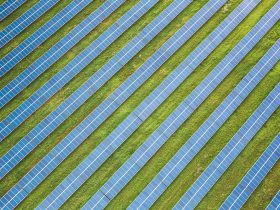The landscape of ethical agriculture investments is constantly evolving, driven by a growing demand for sustainable and socially responsible practices in the food industry. Investors are increasingly recognizing the importance of aligning their investments with ethical principles and environmental stewardship. In this article, we explore some emerging trends that are shaping the future of ethical agriculture investments.
Trend 1: Regenerative Agriculture
Regenerative agriculture is gaining traction as a key trend in ethical agriculture investments. This approach focuses on restoring and enhancing the health of ecosystems, improving soil fertility, and sequestering carbon. Regenerative practices include diverse crop rotations, cover cropping, agroforestry, and the reduction of synthetic inputs. By investing in regenerative agriculture, investors can support projects that have a positive impact on soil health, water quality, and biodiversity, while also aiming for long-term profitability.
Regenerative agriculture stands out as a holistic approach that goes beyond sustainability. It seeks to regenerate the natural systems we rely on for food production, ensuring their resilience in the face of climate change and other environmental challenges. By investing in regenerative agriculture, investors can become agents of positive change, promoting a regenerative mindset within the agricultural industry.
Trend 2: Vertical Farming and Controlled-Environment Agriculture
Vertical farming and controlled-environment agriculture (CEA) are revolutionizing the way we grow food. These practices involve cultivating plants in vertically stacked layers or indoor environments, using artificial light and controlled conditions. Vertical farming and CEA offer numerous advantages, including higher crop yields, reduced water usage, and year-round production, independent of weather conditions.
Investing in vertical farming and CEA allows investors to support sustainable farming methods that minimize land use, conserve resources, and bring food production closer to urban centers, reducing transportation emissions. These technologies also have the potential to address food security challenges in urban areas, where limited land availability and a rapidly growing population pose significant constraints on traditional agriculture.
Trend 3: Plant-Based and Alternative Proteins
The rise of plant-based and alternative proteins presents an exciting opportunity for ethical agriculture investments. As consumer demand for more sustainable and humane food options grows, companies focused on developing plant-based meat substitutes, cultured meat, and insect protein are attracting attention from investors. These investments not only align with ethical considerations related to animal welfare but also contribute to mitigating the environmental impact of traditional livestock farming, such as greenhouse gas emissions and land degradation.
Investing in plant-based and alternative protein companies allows investors to support the development of innovative solutions that can reshape the protein landscape. These investments have the potential to provide consumers with more diverse and sustainable food choices, reduce reliance on animal agriculture, and address the environmental concerns associated with conventional livestock production.
Trend 4: Technology and Precision Agriculture
Technology is transforming the agricultural sector and providing new avenues for ethical investments. Precision agriculture, which utilizes data, sensors, and automation, enables farmers to optimize resource use, reduce chemical inputs, and increase crop yields. By investing in technology-driven solutions for agriculture, investors can support the transition to more sustainable and efficient farming practices.
Agricultural drones, equipped with advanced imaging and mapping technologies, allow farmers to monitor crops, detect pest and disease outbreaks, and target interventions more precisely, reducing the need for broad-spectrum chemical applications. Artificial intelligence (AI) and machine learning algorithms can analyze large volumes of data to provide insights and recommendations to farmers, enabling them to make data-driven decisions. Smart irrigation systems and sensor networks help optimize water usage, minimizing waste and conserving this precious resource.
Investing in technology for agriculture not only promotes sustainable practices but also contributes to increased productivity and profitability for farmers. By supporting the development and adoption of agricultural technologies, investors can play a vital role in driving innovation and sustainability in the sector.

Trend 5: Impact Investing and Sustainable Finance
Another emerging trend in ethical agriculture investments is the rise of impact investing and sustainable finance. Impact investors seek to generate both financial returns and positive social and environmental outcomes. Sustainable finance focuses on incorporating environmental, social, and governance (ESG) criteria into investment decisions. This approach allows investors to support projects and companies that prioritize sustainability, social responsibility, and ethical practices throughout the food supply chain.
Investing with impact and sustainability in mind can involve a range of strategies, such as investing in companies that demonstrate strong ESG performance, directing capital towards projects that address specific social or environmental challenges, or supporting community-based agriculture initiatives. By aligning their investments with their values, investors can contribute to positive change and make a meaningful difference in the agricultural sector.
Conclusion
The future of ethical agriculture investments is promising, with emerging trends reshaping the industry towards more sustainable and socially responsible practices. By investing in regenerative agriculture, vertical farming, CEA, plant-based and alternative proteins, technology, and precision agriculture, and embracing impact investing and sustainable finance, investors can contribute to a more resilient and ethical food system.
As ethical agriculture investments continue to evolve, investors need to stay informed and conduct thorough research. Consider the potential risks and rewards of each investment, evaluate the credibility and track record of companies or projects, and assess their alignment with your own ethical values. By making informed choices, investors can play a significant role in driving positive change in the agricultural sector, promoting sustainability, and contributing to a more ethical and resilient food future.
By staying informed about emerging trends in ethical agriculture investments and considering the potential impact of each investment decision, investors can become catalysts for change in the food industry. The future of ethical agriculture is promising, and by investing in sustainable and socially responsible practices, we can create a more resilient and ethical food system for generations to come.
































